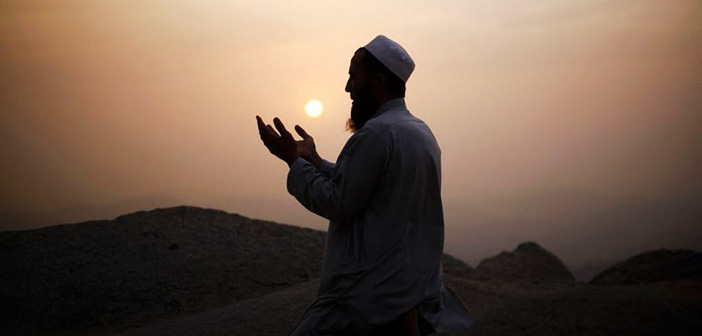What is prayer? What does prayer mean? What does prayer mean in islam? Why important prayer in islam? Prayer in islam…
Prayer is another means put to use by the murshid-i kamil in directing the disciple to the better. This, too, has its roots in the Sunnah of the Blessed Prophet -upon him blessings and peace-.
It is well known that right before becoming Muslim, Omar -Allah be well-pleased with him- was bent on committing the most evil crime thinkable, murdering the Noble Messenger -upon him blessings and peace-. But the blessings of a prayer the Blessed Prophet -upon him blessings and peace- had previously made on his behalf, turned him away from carrying the deed out, becoming honored with the guidance of Islam instead. There are many similar examples in the life of the Prophet -upon him blessings and peace-.
Also renowned is the time when the Blessed Prophet -upon him blessings and peace- was asked during the siege of Taif to curse the Thaqif Tribe, who had exacted so much harm on Muslims. The Prophet of Mercy -upon him blessings and peace- instead prayed for their guidance, a compassionate plea whose blessings soon enabled the entire tribe to arrive at the Blessed Prophet’s -upon him blessings and peace- presence to announce their wish to enter Islam.[1]
Shaybah -Allah be well-pleased with him- recounts the following:
“I was present by the side of the Messenger of Allah -upon him blessings and peace- in the Battle of Hunayn, not because I had become Muslim or accepted the Prophet but because I just could not stomach the fact that the Hawazin Tribe had mobilized an army against Quraysh. During a heated moment of the battle, to the Messenger of Allah -upon him blessings and peace- who was right beside me, I said:
‘I see black and white horses!’
‘Shaybah’, said the Messenger of Allah -upon him blessings and peace-, ‘only nonbelievers are able to see those horses that have come to the aid of Muslims.’ He then patted me on the back and added, ‘Lord…Give Shaybah guidance!’ He did this three times. On the third, as he lifted his hand from my back, there was suddenly nobody on entire Earth, dearer to me than him.” (Ibn Kathir, al-Bidayah, IV, 333)
In spite of having rejected numerous offers of guidance made by her son, the mother of Abu Hurayrah -Allah be well-pleased with him-, the eminent hadith narrator, ended up becoming Muslim thanks to the Blessed Prophet’s prayer.[2] A prayer made by a spiritual inheritor of the Prophet -upon him blessings and peace- also exercises a maximum affect; and this acts an abundant means of spiritual rehabilitation.
Under all circumstances, a prayer reaps a result. Should a prayer be contrary to ‘absolute providence’ and therefore be left hanging, its compensation will be given in the Hereafter, as testified by numerous ahadith.[3]
On the other hand, it is not necessary that the prayer be made by a righteous man of spiritual standing for it to reap a blessing, so long as it is made sincerely, coupled with a serious desire. Hence, even a prayer made by a sinful Muslim on behalf of his brother is of enormous value. For no matter a how sinful His servant might be, Allah, glory unto Him, never forsakes him. If that were the case, backbiting (ghiybah) that is speaking of a misdemeanor of another behind his back, would not have been declared a great sin.
For that reason, it is not right for a person, who for one reason or another cannot manage to stay away from sin, to remain behind from praying for the ummah and their loved ones, falsely thinking that their prayers are of no worth because of their sinful conditions. They prayer of even the most sinful person for another may be accepted, given it is made with a sincere heart, as if wanting the thing for himself. The Lord accepts the prayers of who He wills.
On this note, there lies further benefit in talking about other characteristics of prayer.
The Blessed Prophet -upon him blessings and peace- encouraged Muslims at every opportunity to pray for one another, both in each others presence and absence. To Omar -Allah be well-pleased with him-, who came to ask permission to perform umrah, the Noble Messenger -upon him blessings and peace- had even said:
“Do not forget us in your prayer, brother!” (Tirmidhi, Daawat, 109; Abu Dawud, Witr, 23)
“I became so happy to hear that”, Omar -Allah be well-pleased with him- later said, “it was as if I was given the universe.”
The Blessed Prophet -upon him blessings and peace- is doubtless the most honorable being in the sight of the Almighty. In spite of this, he still asked his Companions to pray for him. This is an indication that people of maturity may benefit even from the prayers of those who are of a lower spiritual rank.
The Blessed Prophet -upon him blessings and peace- again said the following to Omar -Allah be well-pleased with him-: “The best of the Tabiun is a man by the name of Uways. If he were to make an oath on the name of Allah, Allah would surely render his oath valid. Should any one of you come across him, ask him to pray for your forgiveness.”[4] Omar -Allah be well-pleased with him- did meet Uways al-Qarani some time later and asked him to pray on his behalf.
It is thus clear that asking the righteous and pious for a prayer to repel troubles and distress and attract what is good, is something the Blessed Prophet -upon him blessings and peace- actually advised the ummah with.
[1] See, Ibn Hisham, as-Sirah, IV, 103.
[2] See, Muslim, Fadailu’s-Sahabah, 158.
[3] See, Ahmed ibn Hanbal, Musnad, III, 18.
[4] See, Muslim, Fadailu’s-Sahabah, 223-225.
Source: Osman Nuri Topbaş, Sufism, Erkam Publications





